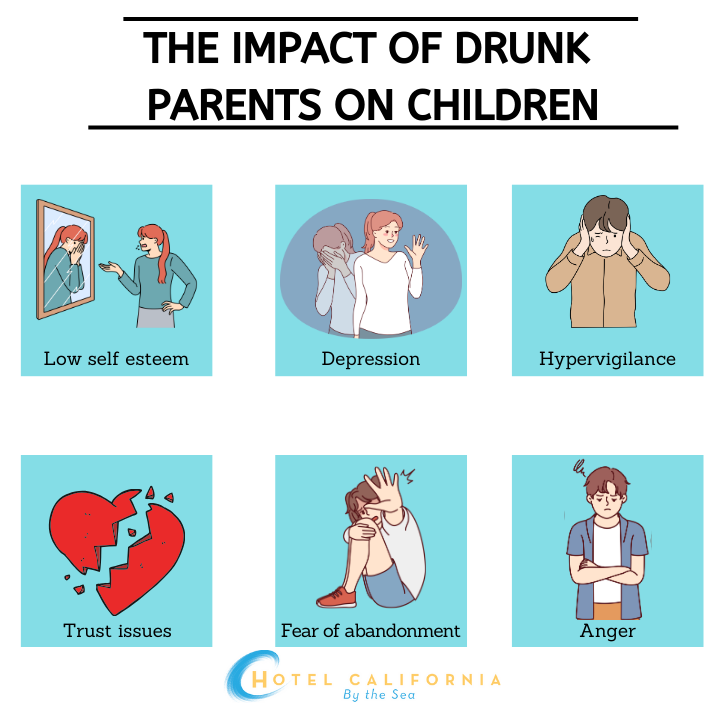How to cope with Drunk Parents
More than 10% of U.S. children ages 17 or younger live with a parent with an alcohol use disorder. Alcoholism can lead to emotional, physical, mental and financial strain on the user as well as their family members. It is especially impactful on children. Often times one of the biggest strains from a parent with alcohol use disorder is neglect of children. Growing up with a drunk parent can have enduring effects on children including impaired learning capacity, increased risk for substance use disorders, increased risk for developing mental health conditions and difficulty maintaining a sense of normalcy.

Alcoholism can cause a parent to act in ways that are extremely out of character, embarrassing or even humiliating to themselves, their children and their family. It can be extremely difficult for children of alcoholic parents. They end up living in an environment filled with fear and anxiety. They may feel a sense of responsibility or guilt towards their parent’s addiction and think they can do more to help their parents. Having drunk parents or at least one parent with an alcohol use disorder can be disruptive to the entire family, especially the children.
Signs that you have a Drunk Parent
- The parent has blackouts or short-term memory loss
- The parent has mood swings, irritability and agitation
- The parent excuses their drinking and bad behavior to other factors
- The parent prioritizes drinking over other obligations
- The parent isolates from friends and family
- The parent often drinks alone or secretly
- The parent has frequent hangovers
- The parent has a drastic change in appearance and behavior

Emotional and Psychological signs of a child who is living with Drunk Parents
- Trust. The child’s trust can be significantly impacted. Often children of an alcoholic parent will have a difficult time trusting others and finding it hard to relax. Inconsistent behaviors from a parent can break down the child’s ability to trust that the parent can provide emotional support, meet their basic needs and maintain a safe and loving environment. Broken promises, frequent disruptions and unreliability of a parent’s actions create a sense of unpredictability which can lead to feelings of guilt, shame, low self-worth, codependency, self-isolation and authoritative defiance.
- Developing a defense mechanism. Children of alcoholic parents tend to develop a strong defense mechanism that is built in order to help them cope with their ever-changing and challenging home environment. It helps them maintain a sense of stability, it helps them maintain a sense of control and it helps them maintain a sense of self-worth.
- Fear and safety. Often in a household with drunk parents, the environment is constantly changing and in some cases, adults can put their families at risk when engaging in dangerous behaviors. Children often feel scared, unsafe and overwhelmed. They are also worried about the health and safety of their parent.
- Perfectionism. Children of alcoholic parents can develop a sense of perfectionism and people-pleasing characteristics. They may be overly concerned with approval from their parent or other adults. They try hard not to upset their parent or stay out of their way to avoid conflict. This type of behavior rooted in fear is detrimental to a child’s physical health and healthy psychological development.
- Codependency. Sometimes, children who live with an alcoholic parent develop codependency traits in which they feel the need to take care of others, especially their alcoholic parent. This can lead to struggling with emotional regulation and learning effective communication skills. It can also lead to an imbalance in relationships with family members, friends and coworkers.
- Mental health disorders. Children of alcoholic parents have a higher risk of developing mental health conditions such as anxiety, depression, PTSD, personality disorders, eating disorders, alcohol use disorder and substance use disorder. In fact, children who have a drunk parent are much more likely to develop these types of behavioral addictions compared to children without a drunk parent.
- Growing up too fast. Most children of alcoholic parents find they need to become adults even before they are ready. They take on adult tasks and responsibilities which can eventually lead to stress, resentment and frustration toward their parent.
- Coming second. Alcoholics will often put alcohol as their top focus and family and children fall on the back burner.
- Feelings of isolation. The stigma behind alcohol addiction can often hinder children to seek out help or advice. They feel they have nowhere or no one to turn to out of fear that others will not understand their situation.
- Self-medication. Children observe their parents participate in drinking, which is sometimes a form of self-medication. They will then see this as a norm and mimic the same behaviors and also choose to self-medicate with alcohol and drugs.
- Self-judgment and self-esteem issues. Children of parents with alcohol addictions find it difficult to take a break. They develop self-esteem issues that bring up feelings of inadequacy that can lead to keeping things to themselves, not speaking up for what they need, and difficulty expressing their emotions.
Unclear sense of normalcy. Children of alcoholics grow up with an unclear sense of normalcy. In their house, alcohol is normalized and they can have a difficult time distinguishing between positive and negative role models.
Check Your Insurance Coverage for FREE
Find out if your insurance covers addiction treatment in minutes. We accept most insurance!
How to cope with Drunk Parents
- Open up and talk to someone you trust about how you are feeling. This can be another family relative, a friend or a teacher. Let them know what you are going through,
- Know that it is not your fault.
- Be able to identify and understand your emotions. Do not try and pretend that everything is ok when it is not.
- Find a safe place and environment to be in.
- Find a support group or group of peers who may be experiencing similar situations. This can help you find comfort in knowing you are not alone and can even offer advice on effective ways to cope.
- Set boundaries and practice self care and learn healthy coping mechanisms to help you manage your situation.
- Seek professional help. Sometimes, your parent’s situation is way beyond your control and means you need to seek out professional help to maintain the health of yourself and your parent.
Reach out to Hotel California by the Sea
We specialize in treating addiction and other co-occurring disorders, such as PTSD. Our Admissions specialists are available to walk you through the best options for treating your addiction.
Treatment for Alcohol Use Disorders
Living with a parent who has an alcohol use disorder can be stressful, difficult and frustrating. Children of drunk parents tend to keep their feelings to themselves, hide what life is like at home, and stress about their parent’s drinking problem. They often blame themselves and feel a sense of shame, guilt and responsibility for not trying to help their parent. However, it is not their fault. Unfortunately, you cannot force someone to change or quit drinking. And you cannot force someone to go to rehab. Behavioral health treatment programs such as Hotel California by the Sea provide professional care to those suffering from an alcohol use disorder.
We provide treatment at all levels of care including detox, residential, PHP and IOP. We utilize evidence-proven treatment methods such as CBT, DBT and EMDR therapy. Hotel California by the Sea is dedicated to helping clients reach their sobriety goals and overcome their addictions.
References:
https://www.verywellmind.com/the-effects-of-parental-alcoholism-on-children-67233
https://www.alcoholhelp.com/support/how-do-i-help-alcoholic-parent/
https://www.choosingtherapy.com/alcoholic-parents/
https://www.addictioncenter.com/alcohol/help-alcoholic-parent
https://kidshealth.org/en/teens/coping-alcoholic.html
